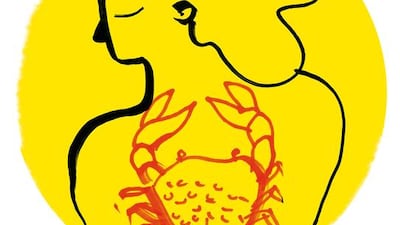1 In the UAE, the two most common forms of cancer are breast cancer in women and colorectal (bowel or colon) cancer in men, according to the Emirates Cancer Foundation.
2 The word cancer is related to the Greek word meaning crab because the finger-like projections of the cells are similar to the shape of a crab.
3 Cancer is not just one disease; rather it is a set of diseases characterised by out-of-control cell growth. Cancer harms the body when the damaged cells divide to form lumps or masses of tissue called tumours which can grow and interfere with the body’s systems. There are more than 100 different types of cancer.
4 There are 28 million cancer survivors worldwide, according to the American Cancer Society.
5 A local study showed that people in the UAE have a more philosophical approach to life than many Westerners, an attitude that enables many to accept diagnosis and treatment of cancer with less anxiety.
6 A drug that helps the immune system to break down cancerous tumours has recently been developed and is set to begin human testing early next year. Researchers at the University of Stanford ran tests of the drug on mice that showed it to be effective on a broad range of cancers with minimal side effects.
7 Re-Mission 2 computer games (www.re-mission2.org) help kids and young adults as they take on the fight of their lives. Each game puts players inside the human body to fight cancer with an arsenal of weapons and real life superpowers, including chemotherapy, antibiotics and the body’s natural defences. The game is an empowering experience for players and helps kids understand their treatment.
8 Breast cancer is still considered a taboo. Doctors say many women in the UAE do not examine themselves to check for unusual lumps due to a lack of awareness.
9 Patients should avoid eating their favourite foods during chemotherapy as the treatment can make the food taste different and give you an aversion to it, according to the Emirates Cancer Foundation.
10 Sharks do get cancer, despite a popular myth suggesting otherwise that has led to their slaughter to harvest the allegedly curative cartilage. It is estimated that North American shark populations have shrunk by 80 per cent in the past decade, with more than 200,000 sharks harvested every month to create a pill that doesn’t work.
11 Approximately 77 per cent of all cancers are diagnosed in people who are 55 years old or older, according to the book Cancer: A Very Short Introduction by Nick James, the founder of the CancerHelp UK website.
12 In 2011, Sheikh Khalifa bin Zayed Al Nahyan gave a donation of US$150 million (Dh551m) to the University of Texas M D Anderson Cancer Center in the United States. The gift was a response to M D Anderson’s treatment of many patients from the UAE. There was a ceremonial signing of the gift agreement at the Khalifa Foundation in Abu Dhabi.
13 Arab nationals, including those from the UAE, tend to develop breast cancer at least a decade earlier than their counterparts in the West, according to a study conducted in 2010 by the Dubai-based Centre for Arab Genomic Studies.
14 According to Cancer Research UK, more than four in 10 cancer cases could be prevented by lifestyle changes. These include not smoking, maintaining a healthy body weight, cutting back on alcohol, eating a healthy diet, avoiding certain infections (like HPV) and staying safe in the sun.
15 Nitrites are chemical additives used to preserve and add flavouring to most lunch meats, including cold cuts and hot dogs. They are considered carcinogens.
16 The first cases of cancer in the world are thought to date back to ancient Egypt, while the first recorded case in the UAE was in 1981, according to the published study Genetic Disorders in the Arab World by Ghazi Omar Tadmouri and Mouza Al-Sharhan.
17 Cervical cancer cases are on the rise in the UAE, with Emiratis accounting for 30 per cent of them. The fatality rate is projected to rise by 25 per cent over the next 10 years. To combat this, Health Authority Abu Dhabi (HAAD) will be implementing a programme in the capital this year that aims to screen (with a Pap smear test) around 70 per cent of the Emirati female population.
18 In June, the Ministry of Social Affairs launched the Positive Cancer Foundation in Abu Dhabi with the aim of spreading community awareness of cancer.
artslife@thenational.ae
• The UAE Cancer Congress draws medical experts from around the world and runs this Thursday to Saturday at the JW Marriot Marquis in Dubai

